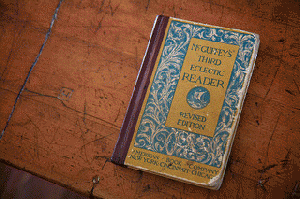When I was a child, my parents bought a set of reprints of the old McGuffey Readers, which had been widely used as elementary school textbooks in the United States until the mid 20th century. When I read them, I was shocked. Mr. McGuffey had obviously expected that most children would learn to read as quickly and easily as I had.
by Rob Shenk
I taught myself to read at age four, by analyzing the spelling of the rhyming words in my Dr. Seuss books. ("Sam. I am Sam. Sam I am. Do you like green eggs and ham?") McGuffey didn't wait for children to figure out those letter-sound relationships on their own. Instead, the first volume of the McGuffey Readers taught children the letter-sound relationships directly. Once children knew how to sound words out, they could read just about any word they saw in print. As a result, the students quickly progressed to reading real literature.
The reading textbooks that I had in school were a lot different from the McGuffey Readers. The authors of our textbooks didn't teach us how to sound words out. Instead, they wanted us to memorize a small set of common words, without paying much attention to the sounds of the letters. The authors then repeated those words endlessly to drill them into our memory. Because of this need for endless repetition of a tiny vocabulary, our schoolbooks contained dull, maddeningly repetitive "stories" of the "See Spot run. Run, Spot, run!"variety.
Because I could already read, I spent my first few school years staring at the walls, bored out of my mind, while the rest of the class struggled to memorize "sight words." Even though our reading textbooks had few if any rhymes, most of my classmates eventually figured out the letter-sound relationships on their own, as I had. A few did not.
One of the girls in my neighborhood still could not read at the end of sixth grade. Then, through sheer dumb luck, she ended up babysitting a child who was getting private tutoring in phonics after having failed to learn to read by the end of second grade. The babysitter ended up learning phonics from the younger child. Thus, both girls suddenly became fluent readers. The older girl told me that she had never been taught phonics in school. Neither had the child she was babysitting. So it was no wonder that neither of them had learned to read in school! Everyone in the neighborhood knew that school had made life miserable for both girls. Their teachers had punished and even mocked them for failing to learn to read. In that light, the school's failure to teach phonics seemed to me to be sickeningly cruel.
When I first read the McGuffey Readers, they filled me with an odd mixture of relief and horror. I was relieved to realize that there was nothing strange about me. I was horrified by the realization that there was something seriously wrong with my school. Since I learned to read before I started school, I was way ahead of my classmates at the beginning of first grade. But if my class had used the McGuffey Readers, most of them would have caught up to me by Christmas. Instead, they ended up wasting several years in learning to read, while I started reading to learn. As a result, I pulled further and further ahead academically.
The school's failure to use an efficient method for teaching reading created a widening social gulf between me and my classmates in school, even though I got along fine with other children outside of school. My classmates started to sneer at me for being "smart." One of my teachers even egged them on, mocking me for knowing things that I hadn't learned in school.
From what I could see, schoolchildren quickly learned that they must put forth at least some minimal effort in school to keep from being punished for failure. Yet most children quickly learned not to embrace learning for its own sake, and not to get too far ahead of the other children, for fear of being shunned socially. The goal of the educational system seemed to be to keep all of the children learning at the same pace, a pace was slow by historical standards.
(Note: You can view every article as one long page if you sign up as an Advocate Member, or higher).






